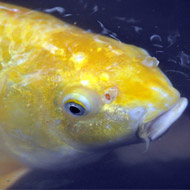
Kippax Polo Pond now subject to statutory controls
An outbreak of Koi herpesvirus (KHV) disease has been confirmed at a pond in West Yorkshire, the Centre for Environment, Fisheries and Aquatic Science (Cefas) has announced.
Kippax Polo Pond in West Yorkshire is now subject to statutory controls to prevent or limit the spread of the disease.
The Fish Health Inspectorate (FHI) at Cefas, acting on behalf of Defra, has issued a confirmed designation prohibiting the movement of fish to, from and within the fishery complex.
The FHI have also implemented fishery equipment disinfection and movement control measures and anglers must ensure that they comply with all biosecurity measures within the designated area.
KHV has no implications for human health. However, it is a serious viral disease of fish, and is notifiable in the United Kingdom. KHV affects all varieties of common and ornamental carp and can result in high rates of fish mortalities.
Clinical signs of KHV disease include white or necrotic patches on the gills, sloughing mucous, rough patches on the skin, and sunken eyes. These signs usually appear when water temperatures are between 16 and 28 degrees centigrade.
Anyone noting deaths in carp or carp hybrids with signs of disease similar to those above should contact the FHI immediately.
Those who import, keep, fish for, or retail carp and carp hybrids are urged to take precautions to prevent the spread of KHV.
Image (C) Wikimedia/Xlibber



 The RCVS has announced a new version of its 1CPD mobile app, with enhanced features for veterinary surgeons and veterinary nurses to record their continuing professional development.
The RCVS has announced a new version of its 1CPD mobile app, with enhanced features for veterinary surgeons and veterinary nurses to record their continuing professional development.